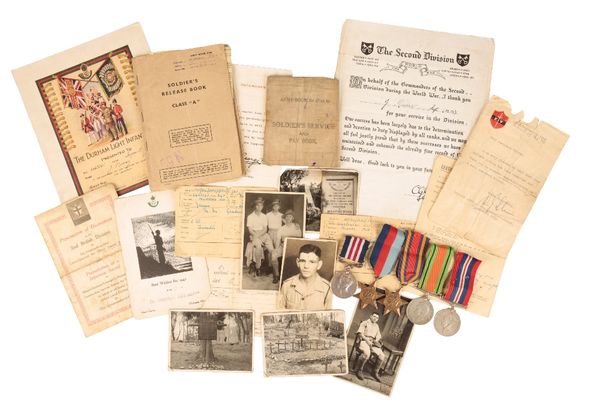OUTSTANDING SECOND WORLD WAR BURMA MILITARY MEDAL GROUP TO SERGEANT J MURRAY
| Estimate: |
£800 - £1,000
|
|
Hammer price:
|
£1,300 |
Bidding ended. Lot has been sold.
OUTSTANDING SECOND WORLD WAR BURMA MILITARY MEDAL GROUP TO SERGEANT J MURRAY 2ND DURHAM LIGHT INFANTRY who was originally recommended for the DCM. Military Medal correctly impressed - 4463241 SJT J Murray Durh L I; 1939/45 Star; Burma Star; Defence Medal; War Medal. Condition GVF+ James Murray was born on 9th May 1913 and a Native of Stanley in County Durham. After leaving school, he went to work at East Tanfield Colliery as a miner, working underground with the railways' section. He then moved to a pit in Sussex, working there for four years before he signed up, joining the Durham light Infantry. A member of the 2nd battalion he was wounded on 23rd April 1944 while serving as a Lance Sergeant. Murray was awarded the Military Medal for the following deed; he had originally been recommended for the Distinguished Conduct Medal; 'At Malegyin on 12th March 1945 Sgt Murray J. 2nd Bn The Durham Light Infantry was commanding 11 Pl 'C' Coy. The Coy was ordered to capture the village of Malegyin and the high ground overlooking it. 11 PI was leading the PI in the attack, which started at 1000hrs. Soon after they crossed the start line, they came under heavy LMG fire. Sgt Murray ordered covering fire, and himself led the other two sections to liquate the enemy. During the latter stages of the attack, he led his Pi through accurate shell fire to attack a party of 30 Japanese who were trying to make their escape the burning village. By skilful leadership, he manoeuvred the enemy into an unfavourable position and put in a quick attack which killed 10 of the enemy besides wounding many others. The PI captured its objective and large quantities of equipment and ammunition. Throughout the engagement, he repeatedly exposed himself to the enemy fire in order to move his section into the most favourable position. The success of the PI action was due to Sgt. Murrays determination and outstanding leadership.' The MM was announced in the London Gazette on 2nd August 1945. Murray survived the war and returned to work in East Tanfield Colliery. The group comes with a number of original pieces of ephemera, such as newspaper clippings of the award; discharge certificates etc.
Read more

